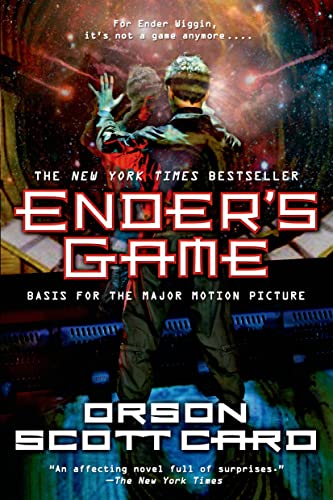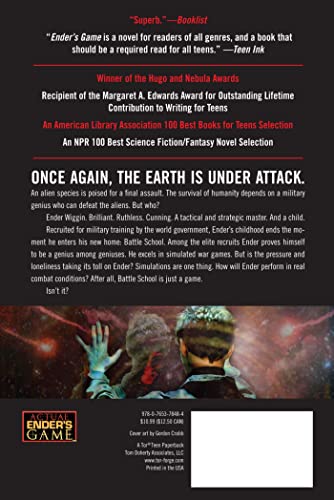Hey folks! Today, I’m here with my review of Ender’s Game, a science fiction novel by Orson Scott Card. Buckle up because this one’s a wild ride, and I’m diving into everything you need to know about it! I’ll be talking about the characters and their development, the plot and pacing, the themes and messages, and the writing style. Whether you’re a first-time reader or a seasoned sci-fi fan, there’s something here for everyone. So grab your popcorn and let’s get started!
Ender’s Game by Orson Scott Card
In a nutshell
Ender’s Game is a sci-fi novel by Orson Scott Card. It follows a young boy named Ender Wiggin as he trains in a space to fight against a potential alien threat. The story dives into themes like the morality of war, the burden of leadership, and the loss of childhood innocence. This fast-paced, action-packed book blends military strategy with deep emotional and ethical questions. If you love science fiction with a touch of psychological drama, this one’s a must-read!
Characters and Development in Ender’s Game
Okay, so let’s chat about the characters in Ender’s Game. Trust me, they are quite the bunch! You got Ender Wiggin, the boy genius who’s picked to save humanity. No pressure, right? The kid is just six when the story starts, but he’s got skills that would make any gamer green with envy.
What’s cool about Ender is his growth. He starts off as this unsure kid and ends up, well, I won’t spoil it, but let’s say the dude becomes legendary. He’s got this mix of empathy and cunning that makes him complex and relatable. I mean, who hasn’t felt like the odd one out at some point?
Then there’s Valentine and Peter, Ender’s siblings. Talk about sibling rivalry! Valentine is like the angel on Ender’s shoulder, while Peter is, well, not so angelic. Oh, and don’t forget Graff, the big cheese at Battle School. This guy is like that teacher who seems mean but actually cares.
One of the best parts is how these characters grow. They don’t stay static; they evolve. You see Ender struggle, adapt, and change. The same goes for the others. The emotional depth makes you invested. You want to know what happens to them next.
But, I gotta admit, not all characters get the same love. Some side characters feel a bit flat. Like, you want to know more about them, but they’re just there to move the plot along. Still, the main cast more than makes up for it.
Next up, let’s talk Plot and Pacing. Trust me, it’s a rollercoaster!
Thrilling Plot and Perfect Pacing in ‘Ender’s Game’
Ender’s Game hooks you from page one. The plot roars forward like a runaway train, and before you know it, you’re neck-deep in alien invasions and zero-gravity battles. Let me tell you, it’s quite a ride!
Ender Wiggin, the main character, is just a kid, but he’s not playing around. The story kicks off with young Ender getting recruited to Battle School, a sort of military Hogwarts in space. A lot of training, a bunch of games, and a sprinkle of space politics later, you realize that the “games” are not just games. They’re survival drills with the weight of the world hanging on them. The pacing makes you feel like you’re in the cockpit with Ender, dodging laser beams and making split-second decisions.
Sometimes, the book slows down to let you catch your breath, but these moments are few and far between. Just when you think you’ve got a handle on things, BAM! Another twist. I tell you, nothing is predictable in this story. Every chapter leaves you craving for the next one like a cliffhanger on steroids. The tension builds up to a climax that will leave you gobsmacked. Trust me, you’ll want to talk about it endlessly with your friends.
However, if I had to nitpick, the fast pace can sometimes make you dizzy. Blink, and you might miss a crucial detail. But, hey, who needs sleep when you’re trying to save the world?
Get ready to warp into the universe of Ender’s Game, because next up, we’re diving into the deep end with its Themes and messages. Stay tuned!
Themes and Messages in Ender’s Game
Let’s chat about the themes in Ender’s Game. The book brilliantly explores the complex theme of childhood vs. adult responsibilities. Ender, our young prodigy, is thrust into situations that force him to act far beyond his age. Seriously, it’s like giving a kid the keys to a tank and saying, ‘Good luck!’ The emotional and moral struggles he faces highlight how kids are often underestimated and overburdened at the same time.
Another standout theme is the morality of war. Is it okay to do terrible things for the greater good? The book tackles this question head-on, making you ponder long after you’ve closed it. Ender’s journey raises ethical dilemmas and questions about the nature of conflict. Are we justified in our actions if we believe we’re doing them for the right reasons? Orson Scott Card doesn’t provide easy answers, which, let’s be honest, is both a gift and a curse.
A subtle but powerful message is the idea of identity and isolation. Ender is constantly grappling with who he is, what he is capable of, and how he fits into the larger picture. His isolation from family, friends, and even himself serves to underscore this sense of displacement. It’s like being the only kid at a grown-up party—you’re important, but you also don’t quite belong.
Manipulation and control is another recurring theme. Ender is manipulated by adults throughout the book, raising questions about autonomy and free will. It’s enough to make you rethink every choice you’ve ever made, wondering who was really pulling the strings.
Next, we’ll take a joyful plunge into the wonderful world of writing style. Stay tuned!
Writing Style in Ender’s Game
Let’s chat about the writing style in Ender’s Game. Orson Scott Card really knows how to keep you on the edge of your seat while making you think.
First off, Card uses simple language that everyone can follow. No need to keep a dictionary on hand. You can just focus on the story without getting lost in fancy words.
Another thing Card is good at is keeping the action flowing. I never found myself bored. It’s like he has a personal vendetta against filler. Even the slower parts have some tension, making you want to keep reading.
Let’s talk about dialog. The way characters speak feels real. There’s a natural flow that makes you feel like you’re eavesdropping on a conversation rather than reading one. It’s impressive considering a lot of the characters are kids. Yet, they sound wise beyond their years, which fits the whole “child genius” theme.
One thing to note, though, is that the book can get pretty technical with military strategies. If you’re not into that stuff, it might feel like a bit of a slog. But for me, it just added to the realism.
Finally, the perspectives. Card often switches between different viewpoints, which gives you a fuller picture of the story. It’s like you’re watching a movie with multiple cameras. Sometimes, though, it can be a bit jarring, especially if you’re really into one character’s storyline.
So, do I recommend Ender’s Game? Absolutely. The writing style makes it an easy yet engaging read. It’s a book that pulls you in and doesn’t let go.
Conclusion
Ender’s Game by Orson Scott Card is a sci-fi gem. It tackles big themes like war, leadership, and growing up, all through a gripping plot and well-developed characters. The writing style is simple but effective, making it easy to get lost in the story. While the book isn’t perfect, it’s a thrilling read that leaves you thinking. If you enjoy a mix of action and deep themes, this one’s for you. This concludes our review!



